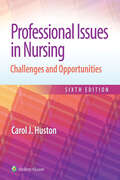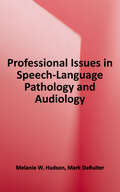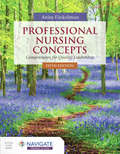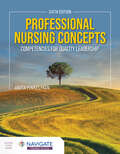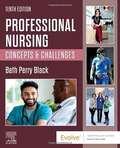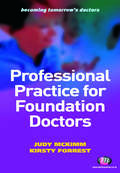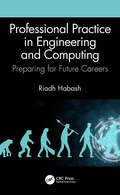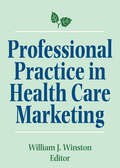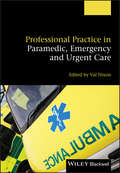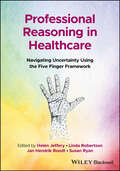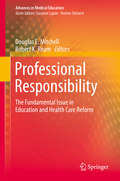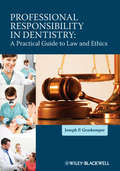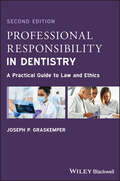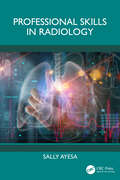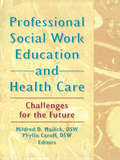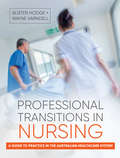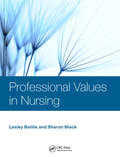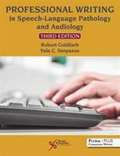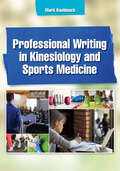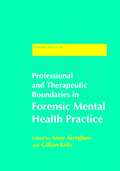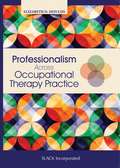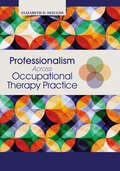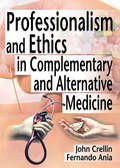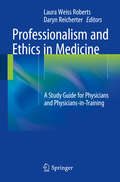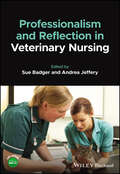- Table View
- List View
Professional Issues in Nursing: Challenges and Opportunities
by Carol HustonGive students a professional edge in nursing practice with proven, expert insight across a variety of enduring and contemporary issues facing today’s nursing workforce. Rich in engaging pedagogical features and extensively updated with the latest evidence-based perspectives on workplace considerations, workforce issues, legal and ethical concerns, nursing education challenges, and more, Professional Issues in Nursing: Challenges and Opportunities, 6th Edition, readies students for the realities of today’s changing healthcare environment and instills the critical thinking and clinical judgment skills to achieve success in any nursing setting.
Professional Issues in Speech-language Pathology and Audiology (G - Reference,information And Interdisciplinary Subjects Ser.)
by Melanie W. Hudson Mark DeRuiterThe fifth edition of this book is a singularly comprehensive resource for students in speech-language pathology and audiology as they prepare for their professional careers. It also serves as a timely source of information for both practitioners and faculty, serving as an updated "state of the professions" desk reference. The book is divided into four major sections: overview of the professions; employment issues; setting-specific issues; and working productively. The information presented in each section provides the reader with a better understanding and a new perspective on how professional issues have been affected by both internal and external influences in recent years including technological advances, demographic shifts, globalization, and economic factors. Chapter authors are recognized subject matter experts, providing a blend of both foundational and cutting-edge information in areas such as evidence-based practice, ethics, finding a job, interprofessional practice, service delivery in healthcare and education, technology, cultural competence, supervision, and leadership.
Professional Nursing Concepts: Competencies for Quality Leadership
by Anita FinkelmanProfessional Nursing Concepts: Competencies for Quality Leadership, Fifth Edition takes a patient-centered, traditional approach to the topic of nursing education
Professional Nursing Concepts: Competencies for Quality Leadership
by Anita FinkelmanProfessional Nursing Concepts: Competencies for Quality Leadership continues its patient-centered, traditional approach to nursing education in an updated sixth edition. Anita Finkelman provides the foundation for pre-licensure nursing students to successfully transition from the classroom into practice. Grounded in the Institute of Medicine/National Academy of Medicine (IOM/NAM) five core competencies for healthcare professionals and the related Quality and Safety for Nursing Education (QSEN) competencies, the content progresses from the basics of the nursing profession and the dynamics of patient care into critical healthcare delivery discussions, ranging from health policy and political action to community health and leadership in nursing practice.
Professional Nursing: Concepts and Challenges
by Beth BlackDiscover what it means to be a professional nurse ― the history, values and standards, and commitment to lifelong learning. Professional Nursing: Concepts & Challenges, 10th Edition equips you with current professional nursing practices to positively impact your career. This easy-to-read text provides insight into the current state of the profession and thoroughly examines standards and scope of practice, with new information on interprofessional education and practice, nursing roles, Covid-19, the surge of ambulatory and community care, bullying, gender issues, clinical judgment, and more.
Professional Practice for Foundation Doctors (Becoming Tomorrow′s Doctors Series)
by Kirsty Forrest Judy McKimmThis book is designed to support trainee doctors during the Foundation Stage of postgraduate training, including preparation and application for Specialty Training posts, and covers the generic (non-clinical) aspects of postgraduate education, training and professional development. It shows trainees how the ′generic skills′ fit into professional practice and development and how the knowledge base provided by the book underpins professional practice. The book will assist the development of the knowledge, skills and competences required for good medical practice and uses case studies, activities and policy examples to illustrate key learning points.
Professional Practice in Engineering and Computing: Preparing for Future Careers
by Riadh HabashThis book has been developed with an intellectual framework to focus on the challenges and specific qualities applicable to graduates on the threshold of their careers. Young professionals have to establish their competence in complying with multifaceted sets of ethical, environmental, social, and technological parameters. This competence has a vital impact on the curricula of higher education programs, because professional bodies today rely on accredited degrees as the main route for membership. Consequently, this four-part book makes a suitable resource for a two-semester undergraduate course in professional practice and career development in universities and colleges. With its comprehensive coverage of a large variety of topics, each part of the book can be used as a reference for other related courses where sustainability, leadership, systems thinking and professional practice are evident and increasingly visible. Features Identifies the values that are unique to the engineering and computing professions, and promotes a general understanding of what it means to be a member of a profession Explains how ethical and legal considerations play a role in engineering practice Discusses the importance of professional communication and reflective practice to a range of audiences Presents the practices of leadership, innovation, entrepreneurship, safety and sustainability in engineering design Analyzes and discusses the contemporary practices of project management, artificial intelligence, and professional career development.
Professional Practice in Health Care Marketing: Proceedings of the American College of Healthcare Marketing
by William WinstonThis informative volume introduces the most current standards for practicality and professionalism in health care marketing. Major health marketers reveal state-of-the-art applications and activities that will keep you on the cutting edge of this growing specialty.
Professional Practice in Paramedic, Emergency and Urgent Care
by Valerie NixonProfessional Practice in Paramedic, Emergency and Urgent Care explores a range of contemporary relevant topics fundamental to professional practice. Written for both pre- and post-registration paramedic students, it is also ideal for existing practitioners looking to develop their CPD skills as well as nursing and other health professionals working in emergency and urgent care settings.Each chapter includes examples, practical exercises and clinical scenarios, helping the reader relate theory to practice and develop critical thinking skillsCovers not only acute patient management but also a range of additional topics to provide a holistic approach to out-of-hospital careCompletion of the material in the book can be used as evidence in professional portfolios as required by the Health and Care Professions CouncilProfessional Practice in Paramedic, Emergency and Urgent Care is a comprehensive, theoretical underpinning to professional practice at all levels of paramedic and out-of-hospital care.
Professional Reasoning in Healthcare: Navigating Uncertainty Using the Five Finger Framework
by Susan Ryan Linda Robertson Helen Jeffery Jan Hendrik RoodtProfessional Reasoning in Healthcare A guide to decision-making and critical thinking in diverse healthcare practice contexts. Professional reasoning is an essential component of health practice. To thrive in a world that demands constant change where there is not necessarily a right or wrong answer, strong frameworks are needed to support effective decision making. Critical to safe, ethical and culturally responsive practice decisions is the ability to integrate information from research evidence, the client, and the context/environment. Practitioners draw from these elements, along with the expertise of others, and through integration of the information with who they are, what they know, and how they operate. This creates a way forward that is right for the client, applicable to the context, and a good fit with themselves. This book provides such a framework. Professional Reasoning in Healthcare: Navigating Uncertainty Using the Five Finger Framework aims to drive a revolution in professional decision-making and critical analysis among healthcare professionals. Built around an innovative framework for fostering thinking, this book illustrates the situated nature of learning and the uniqueness of practice decisions to individual practitioners and clients. The simplicity of the Five Finger framework belies the complexity of reasoning it stimulates. Written using narratives, the reader is able to imagine the situation as the thinking is made visible. It provides simple yet effective tools and techniques for promoting reflective and reflexive thinking and for integrating the evidence into effective decisions. It promises to help readers develop habits of critical thinking that lead to healthier, more effective decision-making processes. Readers will find: Scenarios that bring the professional reasoning to life Tools and techniques to help translate theory into immediate practice Strategies to enhance reflective thinking skills, transformative learning, and sense-making Detailed discussion of topics including team culture, person-centred practice, social learning theory, cultural influences on reasoning, emotional intelligence, and more An overview of transdisciplinary thinking and a complexity-based view on ethics and values Professional Reasoning in Healthcare is ideal for healthcare professionals, managers, students, and educators who are charged with developing skills in making critical decisions in diverse practice contexts.
Professional Responsibility
by Douglas E. Mitchell Robert K. ReamAt the center of this book is the complex and perplexing question of how to design professional preparation programs, organizational management practices, public policy systems and robust professional associations committed to and capable of, maintaining confidence, trust and the other hallmarks of responsible professionalism. To do this, we need to rebuild our understanding of professional responsibility from the ground up. We describe how individuals might be prepared to engage in responsible professional service delivery, examine promising options for the reform of professional service systems and finally, outline a reform strategy for improving practice in education and medicine - two essential public services. The nexus of the reform problem in professionalism is establishing a more robust and effective working relationship between teachers and their students; between health care professionals and their patients and between educators and health professionals. Professionalism means acceptance of professional responsibility for student and patient outcomes -- not just acceptance of responsibility for technical expertise, but commitment to the social norms of the profession, including trustworthiness and responsibility for client wellbeing. In the past, it may have been sufficient to assume that adequate knowledge can be shaped into standards of professional practice. Today, it is clear that we must take careful account of the ways in which practicing professionals develop, internalize and sustain professionalism during their training, along with the ways in which this commitment to professionalism may be undermined by the regulatory, fiscal, technological, political and emotional incentive systems that impinge on professional workplaces and professional employment systems.
Professional Responsibility in Dentistry: A Practical Guide to Law and Ethics
by Joseph P. GraskemperProfessional Responsibility in Dentistry: A Practical Guide to Law and Ethics integrates dental law, risk management, professionalism, and ethics, as all are interrelated in everyday practice. Beyond theory, the fact-based approach of this book shows examples of various situations the dentist may face. Dr. Graskemper addresses a range of topics, from legal concepts and regulation of dentistry to professionalism and ethics. He points out specific issues in the practice of dentistry, particularly those that confront new dentists and dentists with new practices. True Cases throughout the book walk readers through real-world examples of complex situations and discuss the proper way to handle them with attention to the legal, ethical, and practice management ramifications. These include patient charting, professional criticisms, child neglect, associateships, patient refunds, and more.
Professional Responsibility in Dentistry: A Practical Guide to Law and Ethics
by Joseph P. GraskemperPROFESSIONAL RESPONSIBILITY IN DENTISTRY Concise guide to practical information on dental law, ethics, and practice management, all tailored to any dental practice Professional Responsibility in Dentistry, Second Edition is a clinically oriented guide to legal and ethical requirements in a dental practice. This thoroughly revised new edition takes a practical approach, providing examples and case studies of situations that dentists may face, with discussions of dental law, risk management, professionalism, and ethics as they relate to each situation. Divided into four sections to allow for comprehensive and accessible coverage of the subject, the Second Edition adds new chapters on taking practices to the next level and how to read a profit and loss statement, as well as offering updates and new information throughout. Professional Responsibility in Dentistry provides key information on: Lawsuits, including the effects of losing one, the regulation of dentistry, and definitions of important legal concepts in the field The doctor-patient relationship, refusing to treat, medical-dental history, child and elder abuse, informed consent, and record keeping Statute of limitations, abandonment, standard of care, peer review, risk management, and managing employees and associates Starting or buying a practice, marketing for a successful practice, multispecialty practices, and taking your practice from ‘better’ to ‘best’ Bringing legal and ethical issues to life with real-world clinical cases, Professional Responsibility in Dentistry, Second Edition is an essential resource for dental students, new dentists, and any practicing dentist.
Professional Skills in Radiology
by Sally AyesaPracticing as a radiologist is about more than image interpretation. Professional Skills in Radiology provides a concise handbook of essential non-interpretative skills a medical imaging doctor should possess. The book explores important professional development skills needed to work with diagnostic and procedural radiology patients, within healthcare multidisciplinary teams and in the community. It also provides a resource to bring together important concepts in evidence-based practice, research and quality assurance, medical education, advocacy and ethical practice, and cultural safety. Professional Skills in Radiology will be an excellent companion resource for training and consultant radiologists, containing practice questions to help prepare for fellowship/board examinations or interview panels.
Professional Social Work Education and Health Care: Challenges for the Future
by Mildred D Mailick Phyllis CaroffProfessional Social Work Education and Health Care responds to critical concerns about the educational preparation of social workers within the rapidly changing health care environment. Contributors address issues and questions of importance to educators who are contending with the multiple challenges of rapidly changing institutions, fiscal constraints, and service to populations with complex social health care needs. This coverage provides you with important visions of the future education of leaders in health care social work. The editors of Professional Social Work Education and Health Care present information that looks to the future in order to open the floor for communication among the leaders in health care social work settings. Chapters explain the context of social work practice, exploe current social work practice issues, and look into continuing education and fieldwork. In doing so, they give you valuable information about imprtant issues such as: changes in social work department structure and function in challenging economic times collaborative efforts and reciprocal relationships in education and training emergence of networks that will join forces with hospitals preparation for short-term, solution-based social work the remaining need for traditional, long-term social work frameworks and values the shift in ideology to viewing clients as consumers rather than patients modification of curriculum to focus on parenting, health education, adolescent pregnancy prevention, and wellness programs emergence of a model for post-master’s education field work in community-based health care placements versus inpatient hospital settingsThis book’s model for making education and practice responsive to each other and for responding to the needs for collaboration makes it a valuable resource for social work educators, practitioners, and clinicians in health and mental health; advanced gerontologists in academic and practice agencies; and teachers of policy and research in health concentrations in schools of social work. Professional Social Work Education and Health Care is an excellent ancillary text for advanced undergraduate and graduate courses in social work practice in health and mental health and is a strong addition to reading lists for classes on social work with the aged, social work research in health care, and field work seminars in health and mental health.
Professional Transitions in Nursing: A guide to practice in the Australian healthcare system
by Alister Hodge Wayne VarndellWritten by clinical lecturers, Professional Transitions in Nursing provides a practical and accessible guide to the core knowledge and skills required by nurse graduates entering the Australian workforce for the first time. Part I focuses on the structure of the Australian healthcare system and the national competency standards. The authors examine key issues including ethics, law and codes of conduct as well as the leadership, team-building and communication skills necessary in a constantly changing and high-pressure environment. Part II outlines the clinical skills and practices a nurse graduate must master including clinical assessment, risk management and reporting, management plans, diagnostics reasoning, collaboration with other health professionals and working with patients from diverse backgrounds. A special feature is an analysis of issues in Aboriginal and Torres Strait Islander nursing practice. The authors also outline health information systems and technologies and how to utilise these most effectively. Part III looks at career planning and lifelong learning with advice on applying for a nursing position and continual professional development. This is an essential reference for both nursing graduates and overseas qualified nurses seeking to pursue a career in Australia. 'This text will be of tremendous use to new graduate nurses, nurses relocating from overseas and those of us who support these nurses during their transitions. The language is easily accessible and important content about everyday nursing practice is discussed in a practical and logical way. A particular strength is the use of research to support key points of discussion.'Professor Andrea Marshall, Professor of Acute and Complex Care Nursing, Griffith University'This book is a must-have for undergraduates, newly graduated and overseas qualified registered nurses entering the Australian healthcare workforce for the first time. Written by experienced nurses, the book provides essential up-to-date information that is presented in an easily accessible way. I highly recommend this book.' Associate Professor Jacqueline Bloomfield, Sydney Nursing School, University of Sydney 'For educators supporting student, new graduate and international graduate nurses, this text will be an important resource and is superbly structured to guide curriculum development and delivery.'Dr Danny Hills, Senior Lecturer, School of Nursing and Midwifery, Monash University
Professional Values in Nursing
by Lesley Baillie Sharon BlackThis practical guide explores professional values in nursing, helping you to develop safe, compassionate, dignified, person-centred and evidence-based nursing practice. The emphasis of the book is on fundamental values of equality, dignity and caring. The authors discuss holistic nursing care, working in partnership with people and families, workin
Professional Writing In Speech-Language Pathology and Audiology
by Robert Goldfarb Yula C. SerpanosThis book is a resource for students of communication sciences and disorders. It is also used as a textbook for courses in professional writing, clinical methods, and professional issues. Throughout the text, the authors use anecdotal material, self-help questions, and humor to illustrate that learning to be a better professional writer does not require drudgery. The authors cover a spectrum of subjects related to professional writing, including rules of writing, evidence-based writing, ethics of professional writing, use of the library, use and abuse of the Internet, writing for oral presentations, writing diagnostic reports, writing clinical reports, writing for professional advancement. The third edition is responsive to requests from instructors to provide more examples from communication sciences and disorders and increase the amount of practice material. The authors have added content in grammar and rules of writing and increased the number of practice questions and writing exercises in all chapters.
Professional Writing in Kinesiology and Sports Medicine
by Mark KnoblauchPublication of a research article can be a defining moment in a researcher’s career. However, the steps involved in turning an initial research question into a published article can be a long and arduous journey. To aid in this process, Professional Writing in Kinesiology and Sports Medicine was developed to serve as a comprehensive writing guide for research professionals and students who are looking to improve their academic writing skills. Dr. Mark Knoblauch and his 15 contributors developed Professional Writing in Kinesiology and Sports Medicine to focus around the area of manuscript development and presentation, while also including chapters that outline the foundational concepts of professional writing, developing a research grant, and the journal selection process. Each chapter is written by content experts who bring a wealth of experience not only from their own academic writing but also from having spent countless hours helping students become better, more effective writers. Many textbooks have been written that focus on development of the research manuscript itself, but what sets Professional Writing in Kinesiology and Sports Medicine apart is that it includes so much more to aid writers in their process.What you can find inside: Examination of ancillary aspects associated with academic research such as poster and oral presentations How to choose the most effective journal How to deal with the stress of writing How to write an effective grant Professional Writing in Kinesiology and Sports Medicine covers those topics and more, with the intent of providing a thorough, practical writing guide that spans the breadth of the research manuscript development, writing, and presentation process. Throughout the textbook, sample writings and cases relevant to the fields of kinesiology and sports medicine are used to provide the reader relevant, applicable examples to help improve their own writing.
Professional and Therapeutic Boundaries in Forensic Mental Health Practice
by Edited by Anne Aiyegbusi Gillian KellyPeople who are detained in or who use forensic mental health services are defined by the fact that they have violated boundaries, often in many ways. For clinicians employed to work therapeutically with this client group however, the capacity to initiate and maintain boundaries is critical to safety as well as to good treatment outcomes. This book provides a thorough introduction to the subject of professional and therapeutic boundaries and their particular complexities within forensic mental health settings. The contributors, all experts in their respective fields, address the challenges of establishing working boundaries within forensic mental health services from multiple perspectives. They explore the ways in which boundaries can be initiated and maintained in different areas of forensic mental health work, including in psychotherapy, mental health nursing, arts therapies, forensic psychiatry and family therapy, and when working with different client groups, including children and adolescents, offenders with severe personality disorders in high security settings and sex offenders. Consideration is also given to boundaries and homicide, maternal boundary violations and boundaries in a forensic learning disability service. This authoritative, interdisciplinary resource will support all forensic mental health practitioners in this crucial aspect of their work.
Professionalism Across Occupational Therapy Practice
by Elizabeth D. DeIuliisThe purpose of this text is to provide an overview of the wide-ranging professional knowledge, skills, and attitudes that encompass professionalism across the occupational therapy profession. Professionalism can be described as the attributes, characteristics, or behaviors that are not explicitly part of the profession's core of knowledge and technical skills, but are nevertheless required for success in the profession.
Professionalism Across Occupational Therapy Practice
by Elizabeth DeIuliisWhen most people think of professionalism, ethics, or moralism, they often think of a set of rules for distinguishing between right and wrong, such as the proverbial Golden Rule. However, the true definition of professionalism is not an easy one, and it is not necessarily black and white. In fact, it could be argued that it is often easier to describe what is not professional versus what is professional. It could also be disputed that although professionalism can be recognized when you see it, you may not necessarily be able to put your finger on what “it” is exactly.Professionalism Across Occupational Therapy Practice by Dr. Elizabeth D. DeIuliis provides an overview of the wide-ranging knowledge, skills, and attitudes that encompass professionalism across the occupational therapy profession. While there is no formal endorsed definition of professionalism in occupational therapy practice, suggestions are provided to serve as a blueprint for use.“Professionalism in occupational therapy practice is a dynamic sophistication, exemplified by a combination of an individual’s personal skill set, knowledge, behaviors, and attitudes, and the adoption of the moral and ethical values of the profession and society.” Dr. DeIuliis illustrates the concept of professionalism as a unique combination of intrinsic and extrinsic qualities surrounding key constructs of ethics, responsibility, competency and behavior. Professionalism Across Occupational Therapy Practice discusses these various expectations in the academic setting, the clinic, workplace, and in general society.Professionalism Across Occupational Therapy Practice utilizes a developmental approach to teaching and learning, paralleling the Revised Bloom’s Taxonomy (2001). This classification system provides a graded, holistic methodology to human teaching and learning. The concept of professionalism will be exemplified by using both a knowledge-based approach to subject matter requiring higher-level learning such as metacognition, which is a crucial component of professionalism. The chapter objectives and learning activities will challenge the reader to recall, comprehend, apply analysis, synthesize, evaluate, and create knowledge directly to their context. Instructors in educational settings can visit www.efacultylounge.com for additional materials such as informative appendices and resources include sample statements for syllabi & policy manuals, resume and CV templates, interview guidelines, professional development plans and more to be used for teaching in the classroom. Occupational Therapy practitioners at all levels, including fieldwork educators, leaders, managers and researchers will also benefit Professionalism Across Occupational Therapy Practice as it provides a synopsis of professional expectations beyond the classroom and fieldwork setting. Due to recent changes in healthcare, educational standards, and societal influence, the expectation of professionalism has been under greater scrutiny across health and social care professions. Professionalism Across Occupational Therapy Practice is the ideal text to provide a blueprint for occupational therapy students, faculty, and practitioners to fulfill our profession’s potential and achieve the American Occupational Therapy Association’s Vision 2025.
Professionalism and Ethics in Complementary and Alternative Medicine
by Ethan B Russo Fernando Ania John CrellinGain a better understanding of the complex issues that will decide the future of health care!This is the first book of its kind in the rapidly growing field of complementary and alternative medicine. It addresses quality-of-care concerns and also focuses on the goals of many practitioners: to secure a firm place for their practice in health care systems and to establish levels of integration. Professionalism and Ethics in Complementary and Alternative Medicine is a unique textbook, but is also an essential resource for practitioners of complementary, alternative, and conventional medicine as well as the general public.This volume is divided into three parts. The first looks at a range of current concerns over complementary and alternative medicine, many of which raise ethical issues relating to quality of care. The next section, focusing on professionalism, indicates how practitioners must respond to the public’s concerns, especially in light of the public’s rising expectations of standards of care among all practitioners. The third part is comprised of case histories plus commentaries suitable for private study or classroom discussion.In this valuable book you will find: an examination of current issues in complementary/alternative medicine and bioethics explorations of other approaches to ethical dilemmas including “bottom-up” ethics such as consequentialism and social utilitarianism plus feminist ethics, virtue ethics, and more informed discussion of public expectations of professional roles and responsibilities case histories that illustrate ethical issues explanations of the Hippocratic Oath and complementary and alternative medicine codes an examination of the power structure within health care systems and much, much more!Growing from a course on ethics and law at the Homeopathic College of Canada in Toronto, Professionalism and Ethics in Complementary and Alternative Medicine will benefit everyone who is concerned with quality care and integrated medicine.
Professionalism and Ethics in Medicine
by Laura Weiss Roberts Daryn ReicherterProfessionalism and Ethics in Medicine: A Study Guide for Physicians and Physicians-in-Training is a unique self-study guide for practitioners and trainees covering the core competency areas of professionalism, ethics, and cultural sensitivity. This novel title presents real-world dilemmas encountered across the specialties of medicine, offering guidance and relevant information to assist physicians, residents, and medical students in their decision-making. The text is divided into two parts: Foundations and Questions with Answers. The first part provides a substantive foundation of knowledge in the principles, scholarship, policy guidelines, and decision-making strategies of the modern health professions. The second part assists practitioners and trainees in preparing for the complex issues that arise each day in the settings where health professionals work and train - clinics, research centers, educational contexts, and communities. Developed by renowned leaders in a broad range of clinical fields, Professionalism and Ethics in Medicine: A Study Guide for Physicians and Physicians-in-Training is a major, invaluable contribution to the literature and an indispensable reference for clinicians at all levels.
Professionalism and Reflection in Veterinary Nursing
by Andrea Jeffery Sue BadgerProfessionalism and Reflection in Veterinary Nursing Professionalism and Reflection in Veterinary Nursing offers insight into the role of the veterinary nurse in the 21st century. It provides useful information that facilitates a deeper understanding of the underlying theory that supports clinical nursing practice. Exploring concepts that underpin the delivery of professional veterinary nursing, the book covers core issues, themes and principles that explain what it means to be a veterinary nurse. The role of the registered veterinary nurse The registered veterinary nurse’s responsibility to the patient Evidence-based veterinary nursing Veterinary nurse trainer and educator resources A timely publication due to the increased recognition and expectations of the role of the veterinary nursing profession, Professionalism and Reflection in Veterinary Nursing is ideal for veterinary student nurses and qualified veterinary nurses, enabling them to contribute to the development of the professional identity.
